英语常用的62个英语句型
(完整版)英语常用句型大全
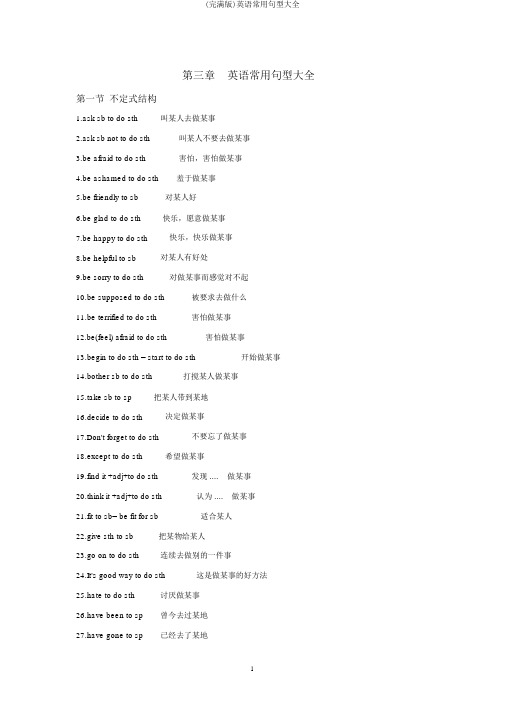
第三章英语常用句型大全第一节不定式结构1.ask sb to do sth叫某人去做某事2.ask sb not to do sth叫某人不要去做某事3.be afraid to do sth害怕,害怕做某事4.be ashamed to do sth羞于做某事5.be friendly to sb对某人好6.be glad to do sth快乐,愿意做某事7.be happy to do sth快乐,快乐做某事8.be helpful to sb对某人有好处9.be sorry to do sth对做某事而感觉对不起10.be supposed to do sth被要求去做什么11.be terrified to do sth害怕做某事12.be(feel) afraid to do sth害怕做某事13.begin to do sth = start to do sth开始做某事14.bother sb to do sth打搅某人做某事15.take sb to sp把某人带到某地16.decide to do sth决定做某事17.Don't forget to do sth不要忘了做某事18.except to do sth希望做某事19.find it +adj+to do sth发现 ....做某事20.think it +adj+to do sth认为 ....做某事21.fit to sb= be fit for sb适合某人22.give sth to sb把某物给某人23.go on to do sth连续去做别的一件事24.It's good way to do sth这是做某事的好方法25.hate to do sth讨厌做某事26.have been to sp曾今去过某地27.have gone to sp已经去了某地28.have sth to do有什么事情要做29.hope to do sth希望做某事30.introduce sb to sb介绍某人给某人认识31.invite sb to do sth邀请某人做某事32.It takes sb +一段时间 +to do sth花多久时间做某事33.It's +adj+ to do sth做某事怎么样34.It's a good idea for sb to do sth对某人来说去做某事是个好想法35.learn to do sth学着去做某事36.make a decision to do sth下定信心做某事37.want to do sth想要做某事38.need to do sth需要去干某事39.offer sth to sb给某人供应某物40.pretend to do sth装着去做某事41.take sth to sb带某物给某人42.like to do sth喜欢做某事43.show sth to do把某物拿给某人看44.encourage sb to do sth激励某人去做某事45.warn sb to do sth劝说某人做某事46.be used to do sth被用来做某事47.It's best to do sth最好去看某事48.stop to do sth停下来往做某事49.Have nothing to do with与做某事不有关50.be allowed to do被同意做某事51.forget to do sth忘记做过某事52.would like to do sth想要做某事53.prefer sth to sth喜欢某物胜过某物54.Prefer to do sth rather than do喜欢做某事胜过做某事55.Say hello to sb向某人问好56.It's time to do sth是做某事的时间到了57.trouble sb to do sth麻烦某人某事58.tell sb to do sth叫某人做某事59.need to do sth需要干某事60.It's a good place to do sth它是做某事的好地方第二节动原结构1.Would you please do sth请你做某事2.can do sth能够做某事 may ,must,could,might,would,should,shall3.be going to do sth打算,将去做某事4.need do sth必定干某事5.had better do sth最好干某事6.have to do sth不得不去做某事7.let sb do sth让某人做某事8.make sb do sth使得某人做某事9.have sb do sth让某人做某事10.Why not do sth为什么不去做某事11.Why don't you do sth你为什么不去做某事12. 句子里面有 do,does,don't,does't did,didn't ,后边动词 +do sth13.prefer to do sth rather than do sth喜欢做某事而不去做某事14.would rather do sth than do sth宁愿而不ed to do sth过去常常做某事16.do nothing but do sth除了做 sth不能够做任何其他事情17.help sb do sth帮助某人做某事18.Feel,listen,look,see,hear,notice,wacth+do sth19.please do sth请做某事20. 神情动词〔 can,may,must,will,ought. to ,might,could,dare to )+动原〔 do sth)第三节动词 ing句型1.feel like doing sth想要做某事2.stop.... .from doing sth阻拦。
启蒙英语 少儿常用的英语口语句型整理
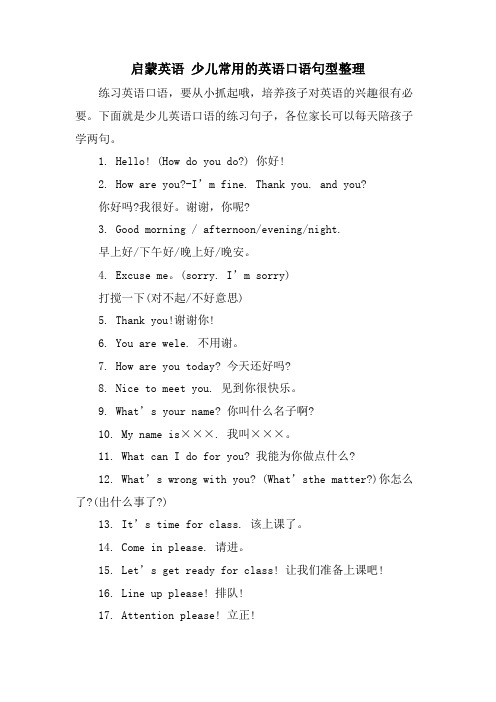
启蒙英语少儿常用的英语口语句型整理练习英语口语,要从小抓起哦,培养孩子对英语的兴趣很有必要。
下面就是少儿英语口语的练习句子,各位家长可以每天陪孩子学两句。
1. Hello! (How do you do?) 你好!2. How are you?-I’m fine. Thank you. and you?你好吗?我很好。
谢谢,你呢?3. Good morning / afternoon/evening/night.早上好/下午好/晚上好/晚安。
4. Excuse me。
(sorry. I’m sorry)打搅一下(对不起/不好意思)5. Thank you!谢谢你!6. You are wele. 不用谢。
7. How are you today? 今天还好吗?8. Nice to meet you. 见到你很快乐。
9. What’s your name? 你叫什么名子啊?10. My name is×××. 我叫×××。
11. What can I do for you? 我能为你做点什么?12. What’s wrong with you? (What’sthe matter?)你怎么了?(出什么事了?)13. It’s time for class. 该上课了。
14. Come in please. 请进。
15. Let’s get ready for class! 让我们准备上课吧!16. Line up please! 排队!17. Attention please! 立正!18. At ease. 稍息。
19. Turn left/right! 向左/右转!20. One bye one please.no pushing. 一个一个来。
不要挤。
21. Let’s go back to the classroom. 让我们回教室去。
小学英语常用的62个英语句型,必备

句型1:There+be +主语+地点状语/ 时间状语There’s a boat in the river.河里有条船。
句型2:What’s wrong with+sb. / sth. ?What’s wrong with your watch?你的手表有什么毛病?句型3:How do you like...?How do you like China?你觉得中国怎么样?句型4:What do you like about...?What do you like about China?你喜欢中国的什么?句型5:had better(not)+动词原形You’d better ask that policeman over there.你最好去问问那边的那个警察。
句型6:How+adj. / adv. +主语+谓语!What a/ an+adj. +n. +主语+谓语!How cold it is today !今天多冷啊!What a fine picture it is!多美的一幅图画呀!句型7:Thank+sb. +for(doing)sth.Thank you for coming to see me.感谢你来看我。
句型8:So+be/ 情态动词/ 助动词+主语He is a student. So am I.他是一个学生,我也是。
句型9:... not ... until ...He didn’t have supper until his parents came back.直到他的父母回来他才吃饭。
句型10:比较级+and+比较级The baby cried harder and harder.那孩子哭得越来越厉害。
句型11:the +比较级,the +比较级The more one has,the more one wants.越有越贪。
句型12:... as +adj./ adv.+as ...…not as(so) +adj. / adv. +as ...Do you think that art is as important as music?你认为艺术和音乐一样重要吗?Last Sunday the weather was not so wet as it is today.上个星期天的天气不如今天的天气潮湿。
小学英语常用62个句型归纳
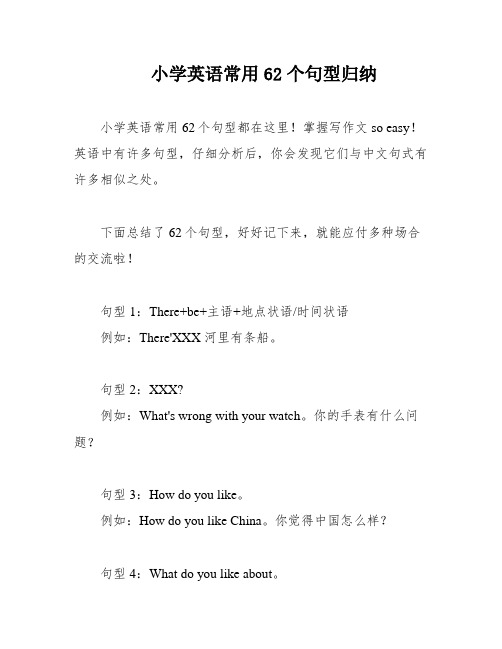
小学英语常用62个句型归纳小学英语常用62个句型都在这里!掌握写作文so easy!英语中有许多句型,仔细分析后,你会发现它们与中文句式有许多相似之处。
下面总结了62个句型,好好记下来,就能应付多种场合的交流啦!句型1:There+be+主语+地点状语/时间状语例如:There'XXX 河里有条船。
句型2:XXX?例如:What's wrong with your watch。
你的手表有什么问题?句型3:How do you like。
例如:How do you like China。
你觉得中国怎么样?句型4:What do you like about。
例如:What do you like about China。
你喜欢中国的什么?句型5:had better(not)+动词原形例如:You'd better ask that policeman over there。
你最好去问问那边的警察。
句型6:How+adj。
/ adv。
+主语+谓语!What a/ an+adj。
+n。
+主语+谓语!例如:How cold it is today。
今天多冷啊!What a fine picture it is。
多美的一幅画啊!句型7:Thank+sb。
+for(doing)sth.例如:Thank you for coming to see me。
感谢你来看我。
句型8:So+be/情态动词/助动词+主语例如:He is a student。
So am I。
他是学生,我也是。
句型9.not。
until。
例如:XXX。
直到他的父母回来他才吃饭。
句型10:比较级+and+比较级例如:XXX XXX。
那孩子哭得越来越厉害。
句型11:the +比较级,the +比较级例如:The more one has,the more one wants。
越有越贪。
Art and music are two different forms of n.艺术和音乐是两种不同的表达形式。
84个英语基本句型

英语是一门广泛使用的语言,掌握基本句型可以帮助我们有效地表达自己的意思。
下面将介绍84个常用的英语基本句型,希望对大家学习英语有所帮助。
1. 主语 + 动词:I eat.2. 主语 + 动词 + 宾语:She reads books.3. 主语 + 不及物动词:They swim.4. 主语 + 系动词 + 表语:He is happy.5. 主语 + 动词 + 间接宾语 + 直接宾语:She gave me a gift.6. 主语 + 动词 + 宾语 + 宾语补足语:We consider him our friend.7. 主语 + 动词 + 间接宾语 + 直接宾语 + 宾语补足语:They made him their leader.8. 主语 + 动词 + 宾语 + 宾语补足语:He painted the wall red.9. 主语 + 动词 + 宾语 + 间接宾语:She told me a joke.10. 主语 + 不及物动词 + 表语:He became a doctor.11. 主语 + 不及物动词 + 宾语补足语:They elected him president.12. 主语 + 不及物动词 + 宾语 + 宾语补足语:She made him her assistant.13. 主语 + 系动词 + 宾语 + 宾语补足语:I find English interesting.14. 主语 + 系动词 + 表语 + 宾语:She called me a fool.15. 主语 + 系动词 + 宾语 + 宾语补足语:He made me his secretary.16. 主语 + 系动词 + 宾语 + 表语:They named the baby Adam.17. 主语 + 状语 + 动词:We ran quickly.18. 主语 + 状语 + 系动词 + 表语:He felt really tired.19. 主语 + 动词 + 状语:She sings beautifully.20. 主语 + 宾语 + 状语 + 动词:He won the game with great effort.21. 主语 + 宾语 + 状语 + 动词 + 宾语补足语:They elected her president with unanimous support.22. 主语 + 谓语 + 宾语 + 状语:We found the key under the bed.23. 主语 + 谓语 + 宾语 + 状语 + 宾语补足语:She named her daughter Lily out of love for flowers.24. 主语 + 谓语 + 不定式:They want to play.25. 主语 + 谓语 + 动词 + 不定式:He can swim.26. 主语 + 谓语 + 宾语 + 动词 + 不定式:She asked me to help.27. 主语 + 谓语 + 不定式 + 宾语补足语:We believe him to be honest.28. 主语 + 谓语 + 宾语 + 不定式 + 宾语补足语:He wants me to be his assistant.29. 主语 + 谓语 + 不定式 + 状语:You need to study hard.30. 主语 + 谓语 + 动名词:She enjoys swimming.31. 主语 + 谓语 + 宾语 + 动名词:They appreciate her singing.32. 主语 + 谓语 + 动名词 + 宾语补足语:I consider cooking an art.33. 主语 + 谓语 + 不定式 + 动名词:He started to learn painting.34. 主语 + 谓语 + 宾语 + 不定式 + 动名词:She saw him come in.35. 主语 + 谓语 + 宾语 + 不定式 + 状语:We made them stay longer.36. 主语 + 谓语 + 不定式 + 宾语补足语 + 动名词:He wants us to help him finish the project.37. 主语 + 谓语 + 不定式 + 宾语补足语 + 状语:I expect you to arrive on time.38. 主语 + 谓语 + 不定式 + 动名词 + 状语:They will try to solve the problem by working together.39. 主语 + 谓语 + 宾语 + 不定式 + 宾语补足语 + 状语:She persuaded him to stay after school for extra practice.40. 主语 + 谓语 + 分词:He looked tired.41. 主语 + 谓语 + 宾语 + 分词:They found the book interesting.42. 主语 + 谓语 + 分词 + 宾语补足语:We consider him qualified for the job.43. 主语 + 谓语 + 不定式 + 分词:She decided to leave quickly.44. 主语 + 谓语 + 宾语 + 不定式 + 分词:He heard her sing beautifully.45. 主语 + 谓语 + 分词 + 状语:They sat there, waiting for the bus.46. 主语 + 谓语 + 宾语 + 分词 + 状语:We saw her boarding the train.47. 主语 + 谓语 + 分词 + 宾语补足语 + 状语:He walked away, satisfied with his achievement.48. 主语 + 谓语 + 分词 + 不定式:She came running to me to ask a question.49. 主语 + 谓语 + 宾语 + 分词 + 不定式:They saw him standing alone in the rain.50. 主语 + 谓语 + 分词 + 宾语 + 不定式:We watched the movie, hoping to be entertained.51. 主语 + 谓语 + 不定式 + 分词 + 宾语补足语:He wants us to stay focused on our goals.52. 主语 + 谓语 + 不定式 + 分词 + 状语:She needs to finish her homework before going out.53. 主语 + 谓语 + 宾语 + 不定式 + 分词 + 状语:They made him work extra hours to meet the deadline.54. 主语 + 谓语 + 不定式 + 分词 + 宾语补足语:We believe you to have the ability to succeed.55. 主语 + 谓语 + 不定式 + 分词 + 宾语补足语 + 状语:He considered it a great honor to be chosen as the team captain.56. 主语 + 谓语 + 分词 + 状语 + 宾语:They finished the task, exhausted.57. 主语 + 谓语 + 宾语 + 分词 + 状语 + 宾语补足语:She found him standing there, helpless.58. 主语 + 谓语 + 分词 + 宾语 + 状语:He left the room, closing the door behind him.59. 主语 + 谓语 + 分词 + 宾语 + 宾语补足语:We saw her painting the wall red.60. 主语 + 谓语 + 宾语 + 分词 + 宾语补足语 + 状语:They heard him singing in the shower, beautifully.61. 主语 + 谓语 + 分词 + 不定式 + 状语:She stood there, not knowing what to say.62. 主语 + 谓语 + 宾语 + 分词 + 不定式 + 状语:He caught her reading his diary, secretly.63. 主语 + 谓语 + 分词 + 宾语 + 不定式 + 状语:They watched the kids playing happily in the park.64. 主语 + 谓语 + 不定式 + 分词 + 状语 + 宾语补足语:We want you to come prepared for the meeting.65. 主语 + 谓语 + 不定式 + 分词 + 宾语 + 状语:She asked me to stay quiet, not attracting attention.66. 主语 + 谓语 + 分词 + 状语 + 宾语 + 宾语补足语:They arrived at the party late, all dressed up.67. 主语 + 谓语 + 分词 + 宾语 + 状语 + 宾语补足语:I left the office, feeling satisfied with my performance.68. 主语 + 谓语 + 分词 + 宾语 + 宾语补足语 + 状语:He walked away, looking disappointed.69. 主语 + 谓语 + 不定式 + 宾语 + 分词:She wants us to keep the door closed, protecting the animals inside.70. 主语 + 谓语 + 不定式 + 状语 + 分词:They need to finish the project, no matter how hard it is.71. 主语 + 谓语 + 不定式 + 宾语 + 分词 + 状语:We would like you to come over for dinner, if you are available.72. 主语 + 谓语 + 不定式 + 分词 + 状语 + 宾语补足语:He decided to work harder, hoping to achieve better results.73. 主语 + 谓语 + 不定式 + 分词 + 宾语补足语 + 状语:She wanted him to leave, regardless of his apology.74. 主语 + 谓语 + 分词 + 宾语 + 不定式:They saw him running down the street to catch the bus.75. 主语 + 谓语 + 分词 + 不定式 + 宾语:He felt someone touch his shoulder, turning around to see who it was.76. 主语 + 谓语 + 分词 + 宾语 + 不定式 + 宾语补足语:She caught her sister eating her chocolate cake, scolding her for the theft.77. 主语 + 谓语 + 不定式 + 分词 + 宾语 + 状语:They asked me to speak louder, not being able to hear me clearly.78. 主语 + 谓语 + 不定式 + 分词 + 状语 + 宾语补足语:We advised him to approach the problem from a different angle, with the hope of finding a solution.79. 主语 + 谓语 + 不定式 + 宾语 + 分词 + 宾语补足语 + 状语:She reminded him to take his medicine, not forgetting his doctor's advice.80. 主语 + 谓语 + 不定式 + 分词 + 宾语 + 状语 + 宾语补足语:He urged them to apply for the position, fully aware of their qualifications. 81. 主语 + 谓语 + 分词 + 不定式 + 状语 + 宾语 + 宾语补足语:They watched the news report excitedly, hoping to see their favorite celebrity mentioned.82. 主语 + 谓语 + 分词 + 不定式 + 宾语 + 宾语补足语 + 状语:She left the room angrily, slamming the door shut.83. 主语 + 谓语 + 不定式 + 分词 + 状语 + 宾语 + 宾语补足语:We told him to study hard, not wasting his potential.84. 主语 + 谓语 + 不定式 + 分词 + 宾语 + 状语 + 宾语补足语:He encouraged her to believe in herself, never doubting her abilities.这些基本句型涵盖了常见的英语句子结构,掌握它们可以帮助你更好地表达自己的思想和意图。
小学英语常用62个句型
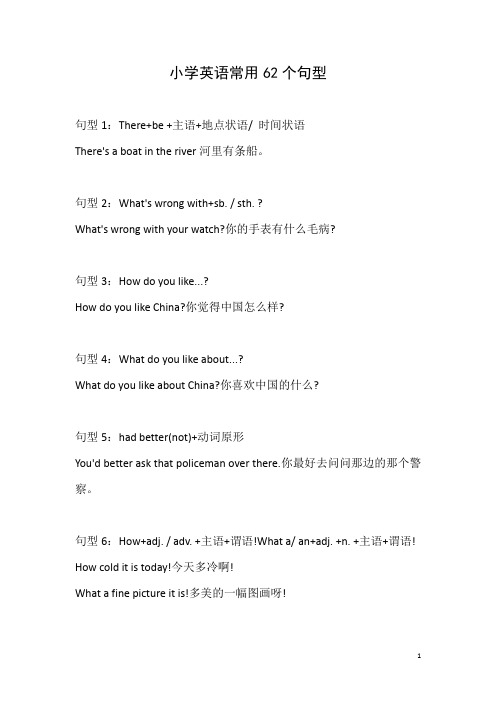
小学英语常用62个句型句型1:There+be +主语+地点状语/ 时间状语There's a boat in the river河里有条船。
句型2:What's wrong with+sb. / sth. ?What's wrong with your watch?你的手表有什么毛病?句型3:How do you like...?How do you like China?你觉得中国怎么样?句型4:What do you like about...?What do you like about China?你喜欢中国的什么?句型5:had better(not)+动词原形You'd better ask that policeman over there.你最好去问问那边的那个警察。
句型6:How+adj. / adv. +主语+谓语!What a/ an+adj. +n. +主语+谓语! How cold it is today!今天多冷啊!What a fine picture it is!多美的一幅图画呀!句型7:Thank+sb. +for(doing)sth.Thank you for coming to see me.感谢你来看我。
句型8:So+be/ 情态动词/ 助动词+主语He is a student. So am I.他是一个学生,我也是。
句型9:... not ... until ...He didn't have supper until his parents came back.直到他的父母回来他才吃饭。
句型10:比较级+and+比较级The baby cried harder and harder.那孩子哭得越来越厉害。
句型11:the +比较级,the +比较级The more one has,the more one wants.越有越贪。
62个常用英语句型和例句

62个常用英语句型和例句:1. Subject + used to + verb...意思:表示过去常常做某事,现在不再做了。
I used to play basketball every day.我过去每天打篮球。
She used to get up early.她过去早起。
John used to stay up late.约翰过去经常熬夜。
2. Subject + be used to + verb-ing/noun.意思:表示习惯于做某事或习惯于某物。
She is used to getting up early.她习惯早起。
He is used to the cold weather.他习惯了寒冷的天气。
They are used to working late.他们习惯了工作到很晚。
3. Subject + prefer + noun/verb-ing + to + noun/verb-ing.意思:表示更喜欢做某事而不是另一件事。
I prefer reading to watching TV.我更喜欢阅读而不是看电视。
She prefers tea to coffee.她更喜欢茶而不是咖啡。
They prefer walking to driving.他们更喜欢步行而不是开车。
4. Subject + had better (not) + verb...意思:表示建议最好做某事或不做某事。
You had better finish your homework.你最好完成作业。
She had better not go out tonight.她今晚最好不要外出。
We had better take an umbrella.我们最好带把伞。
5. It seems that...意思:表示似乎,好像。
It seems that he is not coming.他似乎不来了。
It seems that they are busy.他们似乎很忙。
英语作文万能句子记住这70个万能句型
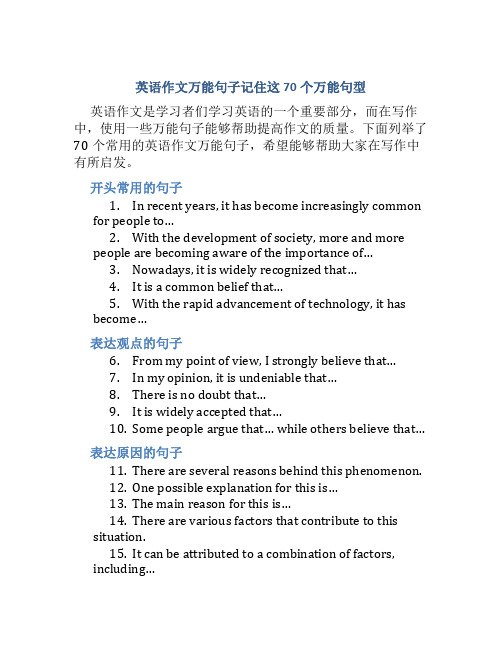
英语作文万能句子记住这70个万能句型英语作文是学习者们学习英语的一个重要部分,而在写作中,使用一些万能句子能够帮助提高作文的质量。
下面列举了70个常用的英语作文万能句子,希望能够帮助大家在写作中有所启发。
开头常用的句子1.In recent years, it has become increasingly commonfor people to…2.With the development of society, more and morepeople are becoming aware of the importance of…3.Nowadays, it is widely recognized that…4.It is a common belief that…5.With the rapid advancement of technology, it hasbecome…表达观点的句子6.From my point of view, I strongly believe that…7.In my opinion, it is undeniable that…8.There is no doubt that…9.It is widely accepted that…10.Some people argue that… while others believe that…表达原因的句子11.There are several reasons behind this phenomenon.12.One possible explanation for this is…13.The main reason for this is…14.There are various factors that contribute to thissituation.15.It can be attributed to a combination of factors,including…举例说明的句子16.For example,…17.Take…for instance.18.A good illustration of this is…19.To give a case in point…20.One classic example is…衯述对比的句子21.On the one hand,… On the other hand,…22.However, there is another side to this issue.23.While it is true that…, it is also true that…pared to…,…25.In contrast to…表达结论的句子26.In conclusion,…27.To sum up,…28.From what has been discussed above,…29.Taking all these factors into consideration,…30.Therefore, it is clear that…引导下一段的句子31.Moving on to the next point,…32.Let us now turn to…33.Having discussed the above points,…34.The next aspect to consider is…35.Let us now consider another perspective…提出建议的句子36.It is recommended that…37.One effective solution to this problem is…38.It is essential that steps be taken to…39.I strongly suggest that…40.It is important to consider ways to…表达感谢的句子41.I would like to express my sincere gratitude for…42.I am deeply thankful for…43.I truly appreciate…44.I would like to extend my thanks to…45.Thank you for your kind assistance.表达愿望的句子46.I hope that…47.It is my wish that…48.I would like to see…49.My fervent hope is that…50.May our dreams come true.反驳观点的句子51.While it may be true that…, it is important to consider…52.Although some people believe that…, I would argue that…53.It is true that some may disagree with this view, but…54.It is worth noting that…55.However, this argument overlooks the fact that…表达感叹的句子56.How surprising it is that…57.What a pity that…58.It is incredible that…59.How wonderful it would be if…60.What a joy it is to…描述情况的句子61.The situation is quite complex because…62.This scenario is further complicated by…63.The data reveals that…64.The analysis indicates that…65.The survey results show that…引用名言的句子66.As the saying goes,…67.In the words of…68.It is often quoted that…69.A famous prove rb says that…70.The wise words of… remind us that…以上便是70个在英语作文中常用的万能句型,希望对大家的写作有所帮助。
英语常用的62个万能句型
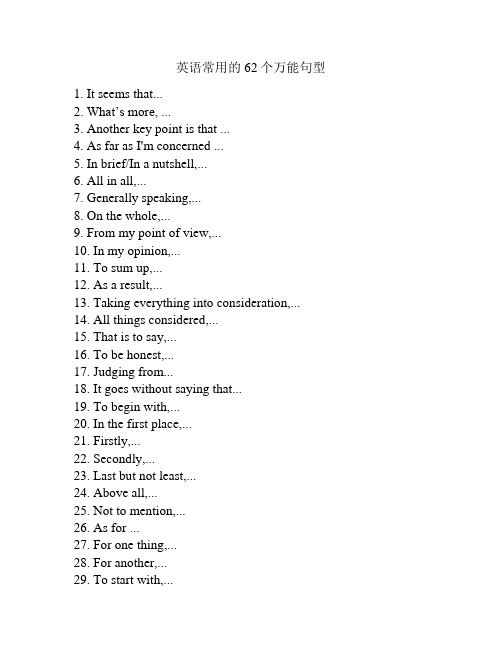
英语常用的62个万能句型1. It seems that...2. What’s more, ...3. Another key point is that ...4. As far as I'm concerned ...5. In brief/In a nutshell,...6. All in all,...7. Generally speaking,...8. On the whole,...9. From my point of view,...10. In my opinion,...11. To sum up,...12. As a result,...13. Taking everything into consideration,...14. All things considered,...15. That is to say,...16. To be honest,...17. Judging from...18. It goes without saying that...19. To begin with,...20. In the first place,...21. Firstly,...22. Secondly,...23. Last but not least,...24. Above all,...25. Not to mention,...26. As for ...27. For one thing,...28. For another,...29. To start with,...30. More importantly,...31. As a matter of fact,...32. On the contrary,...33. In contrast,...34. Despite/In spite of,...35. On the other hand,...36. Even though,...37. Otherwise,...38. Nonetheless,...39. Notwithstanding,...40. Similarly,...41. Likewise,...42. Moreover,...43. Besides,...44. Furthermore,...45. In addition,...46. Again,...47. As well as,...48. Apart from that,...49. Not to forget,...50. It is not uncommon that...51. It is not rare that...52. It is obvious that...53. There is no doubt that...54. Apparently,...55. Ironically,...56. Interestingly,...57. Obviously,...58. In the same way,...59. An important point to remember is that...60. A significant aspect to consider is that...61. To put it differently,...62. To elaborate on this,...。
常用英语口语

1.All in all...总的来说??????用法透视在你说了很多观点之后,用这一短句,进行总结,表示你的讲话即将结束。
2. All you have to do is...你所要做的只是??????用法透视这个句型用来说明某事很简单易行,“你所要做的一切只不过是??????”。
3. As a matter of fact...不瞒你说??????用法透视这个句型的含义接近“in fact”,意思是“不瞒你说;其实;实际上”。
做插入语单独使用。
4. As far as I...就我所??????用法透视as far as的意思是“根据......而言”,这个句型中可以根据情况加入各种不同的动词。
如:as far as I remember / recall / collect...:就我回忆......,as far as I know / tell...:就我所知......,as far asI can see...:依我所见......,as far as I can feel...:就我的感觉......。
5. as far as ...is concerned...就??????而言,??????用法透视这个句型用来引出个人的观点与看法,也可以说“so far as...is concerned”6. Be a good sport.做个有风度的人。
用法透视这个句子引申自“有运动家风度”。
用来劝人要有雅量。
7. be fed up with...对??????腻了用法透视这个句型用来表示极其厌倦或不满。
意思是“对......够了,烦了”。
8. Believe it or not...信不信由你??????用法透视该句用来引出让人惊讶的事情,其字面意义和用法都与中文“信不信由你”一致。
9. Can you give me a hand?你能帮助我吗?用法透视“give a hand”的意思是“出手帮忙”,这个句型可用来要求帮助。
英语常用句型大全
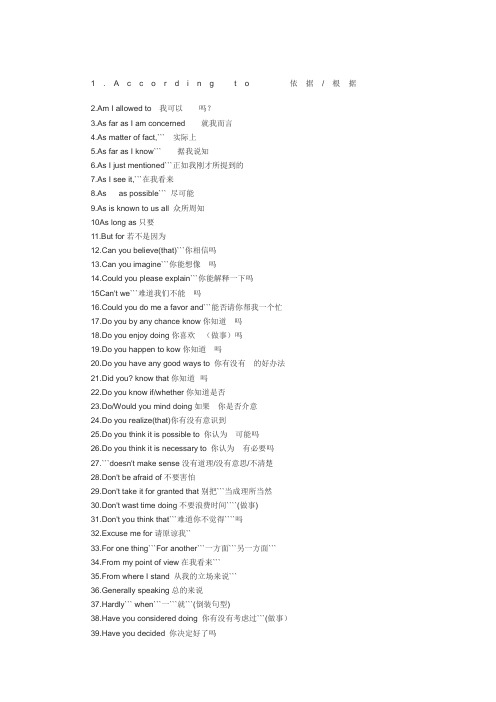
1.A c c o r d i n g t o···依据/根据······2.Am I allowed to···我可以······吗?3.As far as I am concerned······就我而言·····4.As matter of fact,```···实际上···5.As far as I know```······据我说知······6.As I just mentioned```正如我刚才所提到的7.As I see it,```在我看来8.As ··· as possible``` 尽可能···9.As is known to us all 众所周知10As long as只要11.But for若不是因为12.Can you believe(that)```你相信吗13.Can you imagine```你能想像···吗14.Could you please explain```你能解释一下吗15Can't we```难道我们不能···吗16.Could you do me a favor and```能否请你帮我一个忙17.Do you by any chance know你知道···吗18.Do you enjoy doing你喜欢···(做事)吗19.Do you happen to kow你知道···吗20.Do you have any good ways to 你有没有···的好办法21.Did you? know that你知道··吗22.Do you know if/whether你知道是否23.Do/Would you mind doing如果···你是否介意24.Do you realize(that)你有没有意识到25.Do you think it is possible to 你认为···可能吗26.Do you think it is necessary to 你认为···有必要吗27.```doesn't make sense没有道理/没有意思/不清楚28.Don't be afraid of不要害怕29.Don't take it for granted that别把```当成理所当然30.Don't wast time doing不要浪费时间````(做事)31.Don't you think that```难道你不觉得````吗32.Excuse me for请原谅我``33.For one thing```For another```一方面```另一方面```34.From my point of view在我看来```35.From where I stand 从我的立场来说```36.Generally speaking总的来说37.Hardly``` when```一```就```(倒装句型)38.Have you considered doing 你有没有考虑过```(做事)39.Have you decided 你决定好了吗40.Have you ever been to 你曾去过···吗41.Have you thought about /of你有没有想过42.Haven't you heard of难道你没有听过···吗43.How are you getting on/along with···进展如何/与···相处如何44.How are you going to你打算如何45.How does```sound(听起来)怎么样46.How long will it take you to```···要用多长时间47.How should I 我该如何48.I absolutely agree with我完全同意49.I am grateful for 我对···特别感激50.I am planning to 我打算51.I am very pleased to have this opportunity to```我很高兴有机会52.I apologize for我为···道歉53.I believe (that) 我相信54.I believe we should我认为我们应该55.I can't imagine我无法想像56.I can't stand it when我受不了···57.I didn't expect to 我没想到···58.I didn't mean to我不是有意···59.I (don't ) fell like 我(不)想···60.I don't get very excited about我对···不怎么感兴趣61.I don't know how to 我不知道如何···62.I don't see( that)我看不出···我认为···不···63.I an dying to我渴望···我盼望···64.I am fed up of 我厌烦了···我受够了65.I am sick and tired of 我对···感到厌烦66.I hate to disagree with you, but```我不想跟你有不同意见,但是···67.I have confidence in 我相信···我对···有信心68.I have nothing to do with ····跟我无关69.I insist that```我坚决要···70.I insist on doing 我坚持71.I intend to 我打算72. I set my mind to do something/on something.我下定决心73.I strongly advise you to 我强烈建议你···74.I want to express my gratitude to 我要感谢75.I would appreciate it if 如果···,我会非常感激76.It gose without saying that 理应如此/不言而喻···77.It occurred to me that``` ···浮现于我的脑海中;我想起··78.It won't do any harm to``` ···没有任何坏处···79.It helps if```如果···的话,将会(对某人)有好处80.It's long been my dream to ···一直是我的梦想。
最新版 高考满分英语作文必背万能句子及模板(66个高级句型)
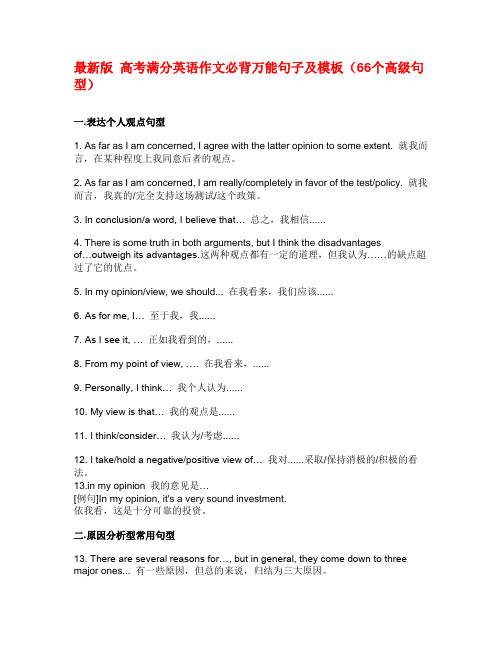
33. Taking into account all the factors, we may safely come to the conclusion that…考虑到所有的因素,我们可以得出结论......
5. In my opinion/view, we should...在我看来,我们应该......
6. As for me, I…至于我,我......
7. As I see it, …正如我看到的,......
8. From my point of view, ….在我看来,......
9. Personally, I think…我个人认为......
41. It is believed that…被认为......
六.议论文常用句型
42. It is a fact that… .…..是一个事实
43. It is well-known that…众所周知……
44.There is no doubt that…毫无疑问……
45. I think that...我认为......
62. The percentage remained steady/stable.百分比保持你定。
63. The figures stayed the same.这些数字保持不变。
64. The figures bottomed out/peaked at…这些数字在......降到最低/升到最高。
19. If we read the book, we will learn a lot.如果我们读这本书,我们就会学到很多。
英语常用的62个万能句型
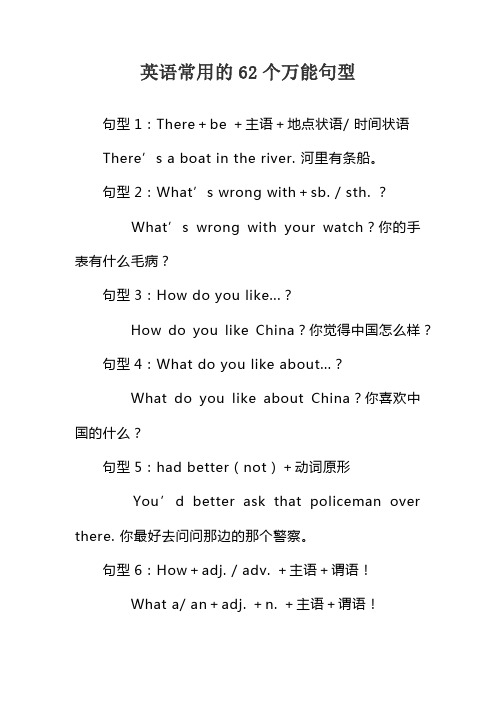
英语常用的62个万能句型句型1:There+be +主语+地点状语/ 时间状语There’s a boat in the river. 河里有条船。
句型2:What’s wrong with+sb. / sth. ?What’s wrong with your watch?你的手表有什么毛病?句型3:How do you like...?How do you like China?你觉得中国怎么样?句型4:What do you like about...?What do you like about China?你喜欢中国的什么?句型5:had better(not)+动词原形You’d better ask that policeman over there. 你最好去问问那边的那个警察。
句型6:How+adj. / adv. +主语+谓语!What a/ an+adj. +n. +主语+谓语!How cold it is today !今天多冷啊!What a fine picture it is!多美的一幅图画呀!句型7:Thank+sb. +for(doing)sth.Thank you for coming to see me. 感谢你来看我。
句型8:So+be/ 情态动词/ 助动词+主语He is a student. So am I. 他是一个学生,我也是。
句型9:... not ... until ...He didn’t have supper until his parents came back. 直到他的父母回来他才吃饭。
句型10:比较级+and+比较级The baby cried harder and harder. 那孩子哭得越来越厉害。
句型11:the +比较级,the +比较级The more one has,the more one wants. 越有越贪。
句型12:... as +adj./ adv.+as ...…not as(so) +adj. / adv. +as ...Do you think that art is as important as music?你认为艺术和音乐一样重要吗?Last Sunday the weather was not so wet as it is today. 上个星期天的天气不如今天的天气潮湿。
!总结的英语口语常用句型
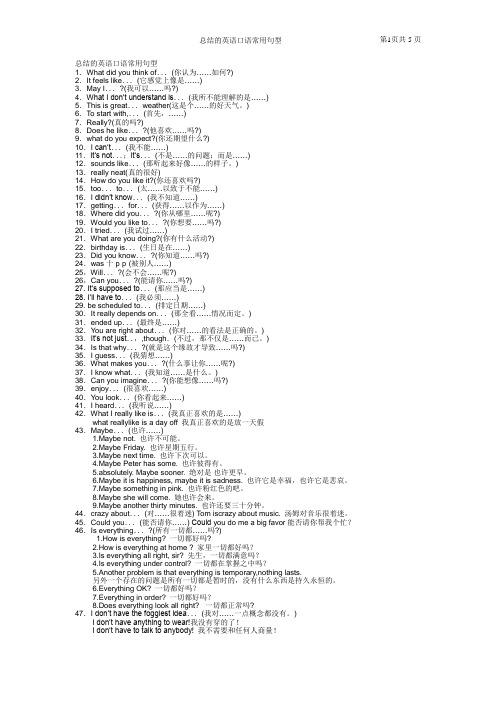
总结的英语口语常用句型1.What did you think of...(你认为……如何?)2.It feels like...(它感觉上像是……)3.May I...?(我可以……吗?)4.What I don’t understand is...(我所不能理解的是……)5.This is great...weather(这是个……的好天气。
)6.To start with,...(首先,……)7.Really?(真的吗?)8.Does he like...?(他喜欢……吗?)9.what do you expect?(你还期望什么?)10.I can’t...(我不能……)11.It’s not...;it’s...(不是……的问题;而是……)12.sounds like...(那听起来好像……的样子。
)13.really neat(真的很好)14.How do you like it?(你还喜欢吗?)15.too...to...(太……以致于不能……)16.I didn’t know...(我不知道……)17.getting...for...(获得……以作为……)18.Where did you...?(你从哪里……呢?)19.Would you like to...?(你想要……吗?)20.I tried...(我试过……)21.What are you doing?(你有什么活动?)22.birthday is...(生日是在……)23.Did you know...?(你知道……吗?)24.was十p·p·(被别人……)25,Will...?(会不会……呢?)26,Can you...?(能请你……吗?)27. It’s supposed to...(那应当是……)28. I’ll have to...(我必须……)29. be scheduled to...(排定日期……)30.It really depends on...(那全看……情况而定。
英语口语常用词汇与句型
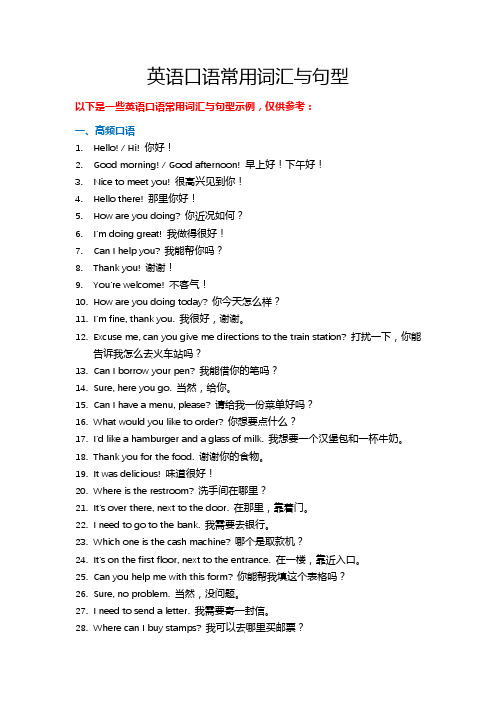
英语口语常用词汇与句型以下是一些英语口语常用词汇与句型示例,仅供参考:一、高频口语1.Hello! / Hi! 你好!2.Good morning! / Good afternoon! 早上好!下午好!3.Nice to meet you! 很高兴见到你!4.Hello there! 那里你好!5.How are you doing? 你近况如何?6.I'm doing great! 我做得很好!7.Can I help you? 我能帮你吗?8.Thank you! 谢谢!9.You're welcome! 不客气!10.How are you doing today? 你今天怎么样?11.I'm fine, thank you. 我很好,谢谢。
12.Excuse me, can you give me directions to the train station? 打扰一下,你能告诉我怎么去火车站吗?13.Can I borrow your pen? 我能借你的笔吗?14.Sure, here you go. 当然,给你。
15.Can I have a menu, please? 请给我一份菜单好吗?16.What would you like to order? 你想要点什么?17.I'd like a hamburger and a glass of milk. 我想要一个汉堡包和一杯牛奶。
18.Thank you for the food. 谢谢你的食物。
19.It was delicious! 味道很好!20.Where is the restroom? 洗手间在哪里?21.It's over there, next to the door. 在那里,靠着门。
22.I need to go to the bank. 我需要去银行。
23.Which one is the cash machine? 哪个是取款机?24.It's on the first floor, next to the entrance. 在一楼,靠近入口。
英语作文常用句型
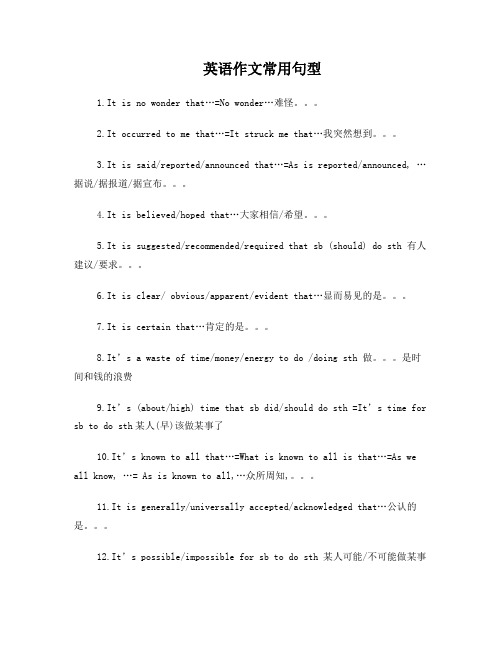
英语作文常用句型1.It is no wonder that…=No wonder…难怪。
2.It occurred to me that…=It struck me that…我突然想到。
3.It is said/reported/announced that…=As is reported/announced, …据说/据报道/据宣布。
4.It is believed/hoped that…大家相信/希望。
5.It is suggested/recommended/required that sb (should) do sth 有人建议/要求。
6.It is clear/ obvious/apparent/evident that…显而易见的是。
7.It is certain that…肯定的是。
8.It’s a waste of time/money/energy to do /doing sth 做。
是时间和钱的浪费9.It’s (about/high) time that sb did/should do sth=It’s time for sb to do sth某人(早)该做某事了10.It’s known to all that…=What is known to all is that…=As we all know, …= As is known to all,…众所周知,。
11.It is generally/universally accepted/acknowledged that…公认的是。
12.It’s possible/impossible for sb to do sth 某人可能/不可能做某事比较:A: There is no/a possibility of one’s doing sth/ that sb will do sth=There is no chance of one’s doing sth 某人(没)有可能做某事B: sb/sth is likely/unlikely to do sth= It is likely that sb/sth will do sth某人(没)有可能做某事/某事壹(没)有可能发生C: Chanc es are that…可能性是。
英语写作高分句型
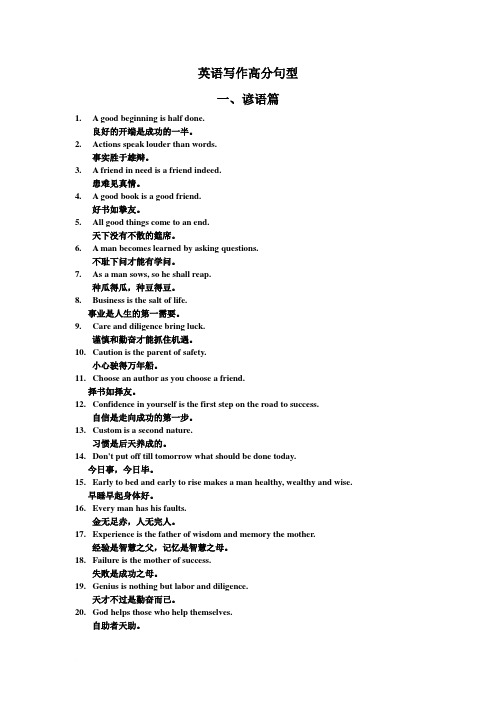
英语写作高分句型一、谚语篇1. A good beginning is half done.良好的开端是成功的一半。
2.Actions speak louder than words.事实胜于雄辩。
3. A friend in need is a friend indeed.患难见真情。
4. A good book is a good friend.好书如挚友。
5.All good things come to an end.天下没有不散的筵席。
6. A man becomes learned by asking questions.不耻下问才能有学问。
7.As a man sows, so he shall reap.种瓜得瓜,种豆得豆。
8.Business is the salt of life.事业是人生的第一需要。
9.Care and diligence bring luck.谨慎和勤奋才能抓住机遇。
10.Caution is the parent of safety.小心驶得万年船。
11.Choose an author as you choose a friend.择书如择友。
12.Confidence in yourself is the first step on the road to success.自信是走向成功的第一步。
13.Custom is a second nature.习惯是后天养成的。
14.Don't put off till tomorrow what should be done today.今日事,今日毕。
15.Early to bed and early to rise makes a man healthy, wealthy and wise.早睡早起身体好。
16.Every man has his faults.金无足赤,人无完人。
17.Experience is the father of wisdom and memory the mother.经验是智慧之父,记忆是智慧之母。
英语学习常用的62个句型,地道口语
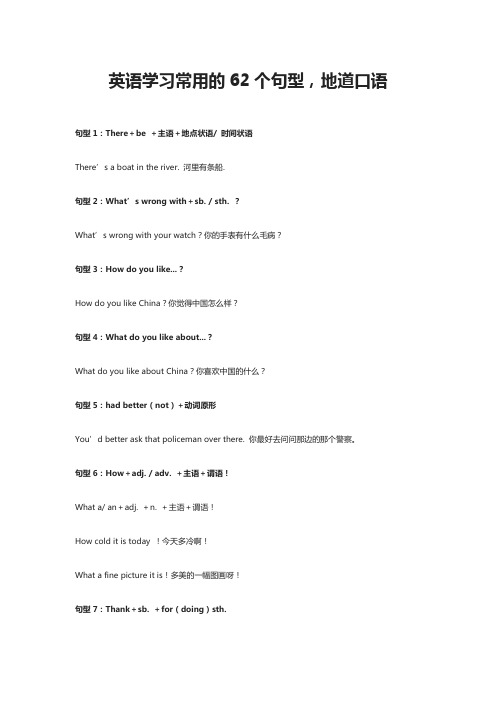
英语学习常用的62个句型,地道口语句型1:There+be +主语+地点状语/ 时间状语There’s a boat in the river. 河里有条船.句型2:What’s wrong with+sb. / sth. ?What’s wrong with your watch?你的手表有什么毛病?句型3:How do you like...?How do you like China?你觉得中国怎么样?句型4:What do you like about...?What do you like about China?你喜欢中国的什么?句型5:had better(not)+动词原形You’d better ask that policeman over there. 你最好去问问那边的那个警察。
句型6:How+adj. / adv. +主语+谓语!What a/ an+adj. +n. +主语+谓语!How cold it is today !今天多冷啊!What a fine picture it is!多美的一幅图画呀!句型7:Thank+sb. +for(doing)sth.Thank you for coming to see me. 感谢你来看我。
句型8:So+be/ 情态动词/ 助动词+主语He is a student. So am I. 他是一个学生,我也是。
句型9:... not ... until ...He didn’t have supper until his parents came back. 直到他的父母回来他才吃饭。
句型10:比较级+and+比较级The baby cried harder and harder. 那孩子哭得越来越厉害。
句型11:the +比较级,the +比较级The more one has,the more one wants. 越有越贪。
- 1、下载文档前请自行甄别文档内容的完整性,平台不提供额外的编辑、内容补充、找答案等附加服务。
- 2、"仅部分预览"的文档,不可在线预览部分如存在完整性等问题,可反馈申请退款(可完整预览的文档不适用该条件!)。
- 3、如文档侵犯您的权益,请联系客服反馈,我们会尽快为您处理(人工客服工作时间:9:00-18:30)。
英语常用的62个英语句型,学英语必须掌握句型1:There+be +主语+地点状语/ 时间状语There’s a boat in the river. 河里有条船。
句型2:What’s wrong with+sb. / sth. ?What’s wrong with your watch?你的手表有什么毛病?句型3:How do you like...?How do you like China?你觉得中国怎么样?句型4:What do you like about...?What do you like about China?你喜欢中国的什么?句型5:had better(not)+动词原形You’d better ask that policeman over there. 你最好去问问那边的那个警察。
句型6:How+adj. / adv. +主语+谓语!What a/ an+adj. +n. +主语+谓语!How cold it is today !今天多冷啊!What a fine picture it is!多美的一幅图画呀!句型7:Thank+sb. +for(doing)sth.Thank you for coming to see me. 感谢你来看我。
句型8:So+be/ 情态动词/ 助动词+主语He is a student. So am I. 他是一个学生,我也是。
句型9:... not ... until ...He didn’t have supper until his parents came back. 直到他的父母回来他才吃饭。
句型10:比较级+and+比较级The baby cried harder and harder. 那孩子哭得越来越厉害。
句型11:the +比较级,the +比较级The more one has,the more one wants. 越有越贪。
句型12:... as +adj./ adv.+as ...…not as(so) +adj. / adv. +as ...Do you think that art is as important as music?你认为艺术和音乐一样重要吗?Last Sunday the weather was not so wet as it is today. 上个星期天的天气不如今天的天气潮湿。
句型13:more/ less +adj.+than...I think art is less important than music. 我认为艺术不如音乐重要。
句型14:stop…from doing sth.The Great Green Wall will stop the wind from blowing the earth away. 绿色长城将阻挡风吹走土壤。
句型15:both ... and ...Both you and I are students. 我和你都是学生。
句型16:either ... or...Either you or he is wrong . 不是你错就是他错。
句型17:neither ... nor ...Neither he nor I am a student. 我和他都不是学生。
句型18:... as soon as ...As soon as I see him,I’ll give him the message. 我一见到他,我就把你的消息告诉他。
句型19:... so+adj. / adv.+that ...I was so tired that I didn’t want to speak. 我累得连话也不想说了。
句型20:Though...+主句Though I like writing to my pen-friend,it takes a lot of time. 虽然我喜欢给笔友写信,但它要耗费我大量时间。
句型21:be going toThis afternoon I’m going to buy a Qisu English book. 今天下午我要去买本奇速英语书。
句型22:be different fromI think this is different from Chinese names. 我认为这与汉语名字不同。
句型23:Welcome(back)to...Welcome back to school!欢迎回到学校!句型24:have fun doingWe’re going to have fun learning and speaking English this term. 这学期我们将兴味盎然地学习和讲英语。
句型25:... because ... / ...,so ...I don’t know all your names because this is our first lesson. 因为这是我们的第一节课,所以我并不知道你们所有人的名字。
句型26:Why don’t you ... / Why not ...Why don’t you come to school a little earlier?为什么不早点到校呢?句型27:make itLet’s make it half past nine. 让我们定在九点半吧!句型28:have nothing to doThey have nothing to do every day. 他们每天无所事事。
句型29:be sure/ be sure of/ about sth. / be sure to do sb.I think so, but I’m not sure. 我想是这样,但不敢确定。
I was not sure of / about the way,so I asked someone. 我对于怎么走没有把握,所以我问别人了。
句型30:between ... and ...There is a shop between the hospital and the school. 在那家医院和那所学校之间有一家商店。
句型31:keep sb. / sth. +adj./ V-ing/ 介词补语/ adv.You must keep your classroom clean. 你们必须保持教室干净。
Sorry to have kept you waiting. 对不起,让你久等。
Can you keep him in the room ?你能让他在这个房里吗?Keep them here. 让他们在这儿呆着。
句型32:find +宾语+宾补He finds it very hard to travel around the big city . 他发现要环游这个大城市是很难的。
句型33:... not ... anymore/ longerThe old man doesn’t travel any more. 这位老人不再旅行了。
He isn’t a thief any longer. 他不再是个贼。
句型34:What’s the weather like...?What’s the weather like in spring in your hometown ?在你们家乡春天天气怎么样?句型35:There is no time to do/ have no time to doThere was no time to think. 没有时间思考。
I have no time to go home for lunch. 我没有时间回家吃午饭。
句型36:Help oneself to...Help yourself to some fish. 吃鱼吧!句型37:used to doI used to read this kind of story books. 我过去常读这种故事书。
句型38:borrow ... fromI borrowed a Qisu English book from him. 我从他那借了一本奇速英语书。
句型39:lend sb. sth. / lend sth. to sb.He lent me a story book / He lent a story book to me. 他借了本故事书给我。
句型40:have been toHave you ever been to Haw aii?你曾去过夏威夷吗?句型41:have gone toWhere’s he?He’s gone to Washington. 他在哪儿?他去华盛顿了。
句型42:be famous forHawaii is famous for its beautiful beaches. 夏威夷以它美丽的海滩而出名。
句型43:No matter +疑问句+主句No matter when you come,you are welcomed. 无论你们什么时候来,都受欢迎。
句型44:be afraid(of / todo / that...)I’m afraid not. 恐怕不能。
Don’t be afraid of making mistakes when speaking English. 当说英语时不要害怕犯错误。
句型45:... as ... as possible / ... as ... as sb canI hope to see him as soon as possible. 我希望能尽快见到他。
He ran here as fast as he could. 他尽最大努力跑到这儿。
句型46:practise / enjoy / finish doingA young man practised speaking English with Mr Green. 一个年青人和格林先生练习说英语。
Tom enjoys playing football very much. 汤姆很喜欢踢足球。
He finished reading the story book. 他看完了那本故事书。
句型47:It’s said that ...It’s said that one of the most dangerous sharks is the Great White Shark. 据说最危险的鲨鱼之一是大白鲨。
句型48:Not all / everyone ...Not all sharks are alike. 并不是所有的鲨鱼都一样。
